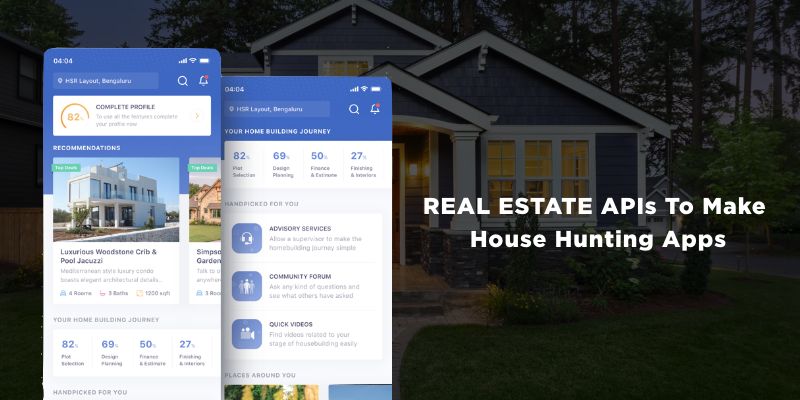Real Estate APIs in 2025: Powering Next-Gen House Hunting Apps & Mobile Platforms
In 2025, real estate technology (PropTech) is evolving at lightning speed, and APIs (Application Programming Interfaces) have become foundational for creating cutting-edge web apps and mobile apps (Android & iOS) that deliver richer property search, valuation, neighborhood insights, and investment analytics. Whether you’re building a B2B platform for real estate brokers, a B2C app for homebuyers, or a hybrid mobile/website service, integrating the right real estate APIs not only improves user experience but boosts trust, performance, and SEO visibility.
Real estate APIs enable seamless connections between front-end apps (including Android and iOS), backend servers, data providers, and third-party services. They feed property listings, market trend analysis, mortgage and financial data, geolocation, maps, neighborhood statistics, and legal/compliance info directly into house hunting portals or apps. With customers in the USA increasingly expecting fast, mobile-friendly, AI-powered experiences, real estate apps powered by robust APIs stand out in both functionality and search engine rankings.
Below are updated insights (2025) into what real estate APIs are, why they matter, key categories, notable services, and how integrating them improves mobile app performance, SEO, and business growth.
What Are Real Estate APIs & Why They Matter in 2025
A real estate API is a set of protocols and tools for requesting and exchanging data such as property listings, valuation, neighborhood info, rental estimates, and compliance documents. They allow developers to pull in data from MLS (Multiple Listing Services), third-party providers, or government sources via formats like JSON, XML, RESTful, GraphQL, etc.
In 2025, APIs matter more than ever because:
Mobile-First & App-First Expectations: Users expect house hunting via Android/iOS apps, mobile web, with fast maps, virtual tours, and instant filters. APIs make this data delivery smooth and scalable.
AI & Predictive Analytics: APIs now feed machine learning models for price prediction, home valuation (Zestimate-style), neighborhood risk scoring (crime, climate or flood risk), walkability, school rating, etc.
Data Enrichment & Trust: In real estate, trust is critical. APIs that provide up-to-date legal compliance, ownership records, tax history, environmental risk boost credibility.
SEO & Local Search Benefit: Sites/apps that deliver rich, structured property data, including neighborhood info, map integrations, and local characteristics, tend to rank higher in search engines—especially for local and voice search (e.g., “homes for sale near me,” “best school districts in [city]”) searches.
Scalability & Developer Efficiency: Using APIs avoids reinventing the wheel. It accelerates development of property listing ingestion, map views, mortgage calculators, interactive mobile/Android & iOS features.
Key Categories of Real Estate APIs in 2025
To build a feature-rich house hunting app or real estate website, you’ll likely use a mix of these API categories:
| Category | What They Provide | Why They’re Important for Apps & SEO |
|---|---|---|
| Property Data & Valuation APIs | Ownership, historical transaction data, property characteristics, estimated valuations, investment ROI models. | Enables features like “compare homes”, “what’s my home worth”, “investment potential”—content that draws search traffic and keeps users engaged. |
| Listings & Search APIs (MLS, Property Listings) | Real-time listing data for sale or rent, including photos, details, geolocation. | Essential for Freshness & Relevance signals. Helps mobile for map-based search, geofenced filtering. |
| Mortgage / Financial APIs | Rate quotes, affordability calculators, loan application status, payment estimation. | Value-added features that encourage longer session duration, local search intent (e.g., mortgage rates in [city/state]), useful for SEO. |
| Neighborhood, Demographic & Geo APIs | Crime rates, school ratings, walkability/scores, transit, commute times, climate risks. | Helps in crafting content around “liveability”, “best neighborhoods”, supports voice search (“which neighborhoods in Phoenix are family-friendly?”). |
| Maps, Geolocation, Visualization APIs | Interactive maps, map overlays, heat maps, satellite/street view, property boundary data. | Essential for Android/iOS apps and responsive web. Map data enhances UX and dwell time, good for SEO. |
| Property Management & CRM APIs | Tenant screening, leasing workflows, maintenance logs, accounting, client relationship tools. | Useful for B2B platforms; helps integrate listings & user data; boosts site’s authority with practical tools. |
| Legal & Compliance APIs | Ownership records, liens, permits, disclosures, e-signature. | Increasingly important in compliance-focused markets; enhances trust and authoritativeness. |
Top Real Estate APIs to Consider in 2025
These are some standout real estate APIs in 2025, used by professionals for property platforms, apps, and data-driven websites in the USA.
ATTOM Data API – Covers large datasets: property ownership, neighborhood insights, tax, and environmental data. Great for apps or websites targeting rich detail.
- Mashvisor API – Useful for investors: rental income predictions, investment property analytics. Ideal for mobile apps that target real estate investors wanting income forecasts.
- Estated Data API – Real-time property data, historical data; useful for building property valuation features.
- Zillow API / Zillow Listings / Zestimate – Popular consumer-facing property listing and valuation toolset. Many house hunting apps embed Zillow data to allow “instant home value estimates” or “homes for sale” feeds.
- Walk Score API – Ratings for walkability, transit access; complements neighborhood insights. Great for feature content (“neighborhood quality”) that ranks well for “best walkable neighborhoods in [city]”.
- Google Maps API / Mapbox – For mapping, visualization, location-based search, street view. Crucial for mobile apps.
- Realtor.com API, Redfin API – For current property listings, market trends. Useful for both consumer apps and agent dashboards.
How Real Estate APIs Improve Mobile Apps (Android & iOS) & SEO in 2025
When building or optimizing a house hunting app, website, or mobile-web hybrid, integrating real estate APIs can lead to:
Faster, UX-friendly mobile app performance – lightweight API calls, map clustering, lazy loading of images/photos, offline mode for maps, responsive UI, and smooth filtering/search. For Android and iOS apps, API endpoints with efficient pagination and caching improve both speed and data usage.
Better content for SEO & voice search – detailed neighborhood demographics, “school ratings in [city]”, “homes for sale near me”, “best mortgage rates in [state]” content that answers user queries directly. APIs provide the structured data needed to populate FAQ schema, How-To schema, and local business schema.
Rich data for app store and mobile marketing – integrating APIs enables features such as virtual tours, map-based searches, live mortgage calculations, which can be used in screenshots, descriptions, and video previews in Google Play / Apple App Store to improve conversions.
Personalized & predictive experiences – using AI/ML models fed by API data for recommending homes, predicting price changes, showing risk assessments; helps retention and increases time in app/website. Personalization also supports SEO through repeated user engagements and return visits.
Trust & Authority Signals – Displaying compliance info, legal disclosures, ownership histories (via legal APIs), and partnered data sources (ATTOM, Zillow etc.) helps with E-E-A-T. Mentioning verified, credible API providers in your “About” or product documentation shows author expertise and trustworthiness.
Best Practices & Recommendations for Real Estate House Hunting Apps & Websites in 2025
To fully leverage real estate APIs and maximize both app performance and SEO for USA-based audiences, follow these guidelines:
Mobile-First design & speed optimization: Optimize image sizes, lazy-load property photos, ensure listing/search filters load quickly, minimize API response times, use edge caching/CDNs. For Android and iOS apps ensure minimal network usage and smooth UI transitions.
Structured data & schema markup: Use property listing schema, local business schema, FAQ schema, How-To schema, offer schema for mortgages, review schema for neighborhoods, etc. Rich snippets boost organic rankings.
Voice search & conversational queries: Include content that answers queries like “What is property tax in [city]?”, “Homes for sale under $500K in [zipcode]”, “Which neighborhoods have good schools”, etc. These phrases are growing in voice-search volume.
Local & geo-targeted content: Create pages or app views for specific cities, neighborhoods, ZIP codes. Use localized data via APIs (demographics, schools, transit) to rank for city- or neighborhood-level queries.
Transparent sourcing & credibility: Mention data sources, API providers, ownership data, compliance. Include about the API services used, how often data updates. Display author bios and credentials if writing content about real estate and data analytics.
AI and predictive analytics: Use API data to feed AI/ML models for home price prediction, risk scoring, trends. Use these insights in blog content, app features, marketing. But ensure model explanations are clear, and data is accurate and trustworthy.
Regular updates & freshness: Real estate market changes fast. Update data, refresh content, revise valuation models, ensure that property availability and pricing are current. Fresh content signals relevance to Google.
Building a Real Estate House Hunting App with APIs
Suppose your company in the USA is developing an Android and iOS real estate app that helps users find homes, estimate prices, and explore neighborhoods. You might integrate:
Zillow or ATTOM API for listing & valuation
Walk Score API for neighborhood walkability
Google Maps / Mapbox for maps & location search
Mortgage rate / financial API for affordability calculators
Legal/compliance APIs to display ownership, tax history, disclosures
A CRM API connection for agent contacts, leads, or property management
Combine this with strong frontend design (mobile-friendly UI), caching, offline map tiles for mobile, push notifications, and a backend that answers user queries like “homes near me with 3 bedrooms under $400K”. Enrich blog or content sections with “top school districts in [city]”, “future real estate trends 2025”, etc., to capture long-tail keywords and voice search traffic.
Conclusion
In 2025, successful real estate apps and websites are those that integrate powerful, up-to-date APIs to deliver rich, mobile-first, data-driven experiences, while also maintaining trust, legal compliance, and transparency. If you build or update a property listing platform, house hunting app, or real estate content site in the USA, using robust real estate APIs, focusing on SEO best practices (mobile optimization, local & voice queries, structured data), and staying ahead with predictive analytics and AI will give you a competitive edge. The right mix of APIs, app/Android/iOS features, and credible content will help you attract more users, higher engagement, and better organic search rankings.
The growth of the PropTech industry, short for “property technology,” is clearly reflected in the rise of real estate APIs. These APIs for real estate serve professionals, marketers, investors, and anyone seeking property data and insights.
The best residential real estate APIs offer access to extensive data, powered by artificial intelligence, to streamline property searches, predict market trends, and guide investment decisions. These APIs provide valuable information such as neighborhood data, crime statistics, geo-based climate risk assessments, and noise pollution levels. By integrating real estate APIs into websites, users and subscribers can easily access this critical information.
Nowadays the customers are choosing the fastest and they are searching for the most convenient method to buy, rent or sell a house. Without turning to real estate agents, specific real estate applications let us do anything convenient. The mobile and web apps that are used in real estate are getting more advanced and more sophisticated than before. If you are looking to build your real estate app like Buildium then there are some real estate APIs that are particularly useful for software developers and real estate professionals. Read on more to know what an API is and here is a list of real estate APIs that are useful to make house hunting apps.
Real Estate APIs
API enables the interaction between the different software components or real estate apps. It is the set of rules and the process that help to enable the interactions. With real estate, to pull the data from the third-party databases the APIs are used. To integrate the property listings into your application you can use third-party APIs. Some of them you can also use are listed below.
- FTP Protocol
- Real estate protocol
- IDX framing
The real estate companies rely on the APIs and data feed which can help them in supplementing the real estate listings with relevant property data. These APIs have different functionalities including,
- Listing data
- MLS feed
- Mortgage data
- Rental estimates
- Walk score and other data
What's API used for real estate?
APIs, including commercial real estate APIs, are the interface that connects a website visitor to the data they need, linking the front-end to the back-end system through XML, JSON, or other technology.
While some APIs, like a free real estate API, are available at no cost, most charge a fee based on the amount of data accessed—either through a flat rate, subscription, or negotiated pricing. Typically, the more you pay, the more detailed data you can access and provide to clients.
The benefits of APIs in real estate are immense. Depending on the API, they may provide basic datasets, such as MLS listings, or incorporate AI and machine-learning tools to extract trends, patterns, and predictive insights from the data. Real estate APIs empower businesses by offering detailed property listings, market trends, and neighborhood insights, making them indispensable for both residential and commercial real estate platforms.
list of Real Estate APIs by Category
Property Data APIs
- Zillow API: Provides property data including valuations, listing details, and property characteristics.
- Realtor.com API: Accesses property listings, home values, and detailed real estate market data.
- Mashvisor API: Offers property analysis, investment opportunities, and rental income predictions.
- Estated API: Delivers property data including ownership, taxes, assessments, and sales history.
- ATTOM Data API: Provides comprehensive property data, including neighborhood insights, crime data, and school information.
2. Listing & Search APIs
- MLS API: Integrates Multiple Listing Service data for active real estate listings.
- Redfin API: Offers access to real estate listings, property values, and market trends.
- Zillow Listings API: Accesses Zillow’s extensive property listings database.
- Homesnap API: Provides real-time access to MLS listings and agent contact information.
- Realty Mole Property API: Delivers property listings, rental estimates, and neighborhood data.
3. Real Estate Valuation & Investment APIs
- Zillow Zestimate API: Provides home valuation estimates based on Zillow’s proprietary algorithm.
- PropertyRadar API: Focuses on property valuations, market insights, and investment opportunities.
- HouseCanary API: Offers valuation models, investment analytics, and risk assessments.
- CoreLogic API: Provides property valuation and analytics for residential and commercial real estate.
- Mashvisor Investment Property API: Analyzes investment property potential with rental income and ROI data.
4. Mortgage & Financial APIs
- Better Mortgage API: Provides mortgage rate quotes, pre-approvals, and loan application services.
- Freddie Mac Loan Look-Up API: Identifies properties associated with Freddie Mac-owned mortgages.
- Plaid API: Connects to financial data for mortgage and rent payment processing.
- Quicken Loans API: Offers mortgage rate information and loan application processes.
- Zillow Mortgage API: Provides mortgage rates and affordability calculators.
5. Geographic & Neighborhood Data APIs
- Google Maps API: Delivers geographic data, property mapping, and neighborhood boundaries.
- Walk Score API: Provides walkability scores, transit scores, and bike scores for neighborhoods.
- NeighborhoodScout API: Offers crime data, school quality, and demographic information for neighborhoods.
- Mapbox API: Enables customized maps with real estate data overlay.
- SchoolDigger API: Provides detailed school information, rankings, and boundaries.
6. Property Management & CRM APIs
- Buildium API: A property management solution that integrates with accounting, maintenance, and leasing.
- AppFolio API: Provides property management tools for marketing, leasing, and accounting.
- Propertyware API: Focuses on property management with CRM, accounting, and leasing capabilities.
- Zoho CRM API: A flexible CRM tool that can be tailored for real estate business needs.
- HubSpot CRM API: Integrates CRM functionalities for managing real estate client relationships and sales.
7. Legal & Compliance APIs
- LexisNexis Property Data API: Provides property-related legal documents, ownership data, and liens.
- CoreLogic Compliance API: Ensures compliance with real estate regulations and laws.
- SafeRent API: Delivers tenant screening services including credit checks and criminal background checks.
- DocuSign API: Allows for electronic signature and document management for real estate transactions.
- ComplianceEase API: Provides automated compliance checks for mortgage lending.
List Of best Free Real Estate API And Housing APIs
Here is a list of the best APIs in real estate.
Mashvior API
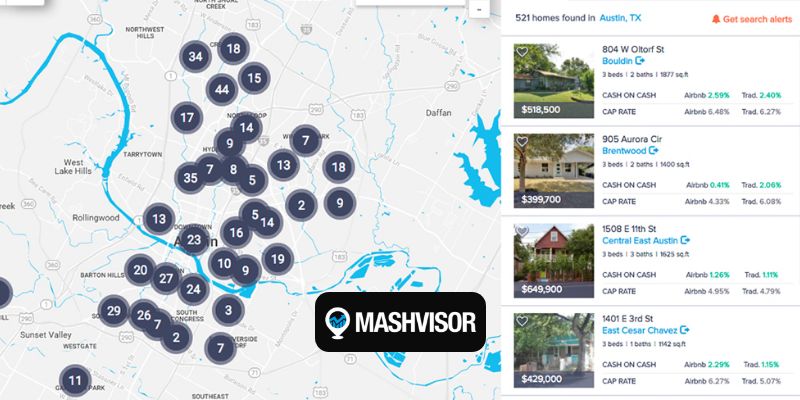
With the Mashvisor Real Estate API, investors can gain deep insights into which properties are the most profitable in a given location. This powerful Property Data API allows users to access not only basic details but also in-depth analysis, enabling more informed investment decisions. Detailed data on each property, including descriptions, home types, addresses, environmental conditions, sizes, property photos, images, construction year, prices, and more, are all readily available. There’s no need to sift through all the information on every property—this API delivers targeted data for the specific properties of interest. Additionally, with Mashvisor’s real estate listing API, users can access valuable information about property owners. This API also enables the most accurate predictions of potential future income in specific areas, making it an essential tool for real estate investors. Plus, it can seamlessly integrate with a free CRM for real estate professionals to streamline the management of property data and client interactions.
Also Read:
ATTOM property API
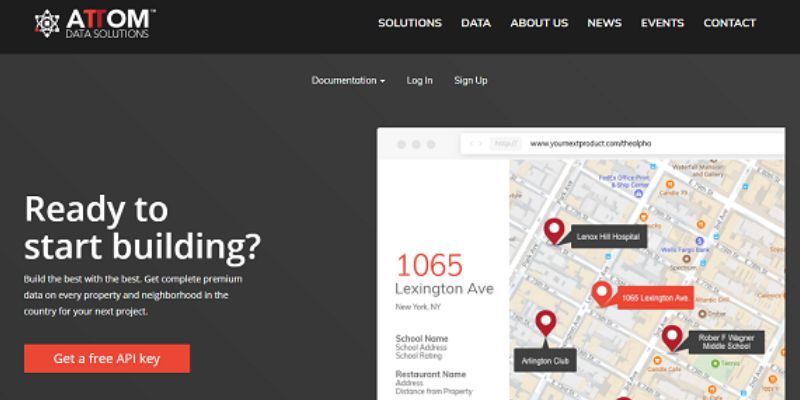
Another useful API for real estate purposes is the ATTOM property API. This provides a solution that is more effective and suitable for different markets dealing with the properties.
When it comes to the key benefits, this has a powerful commercial property database. This includes the information of more than 150 million real estate objects. The data present about the object are advanced in nature and cover many useful aspects. This also implies the ownership info and even the criminal situation in the specific location. It also has a trial period so that you can make sure whether it suits you or not.
This API can obtain data in a specific area. That could be of any level and type. The team of AATTOM will be more than a faithful assistant to make sure that you have integrated the solution without any problem.
Estated data API
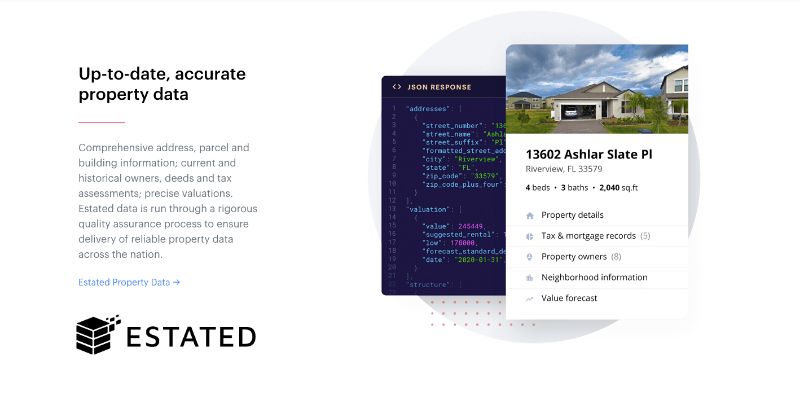
It is very important to know about the estated API. This allows you to quickly and reliably find the right information on property to the specified parameters. This is a great solution and is used by many smart real estate experts such as brokers, investors, insurance workers, and others. This service is the most affordable and its functionality helps to save time and effort.
It has detailed, real-time, updatable data on real estate. It has more information about the historical and current condition of each object. This API has an impressive customer database and has been selected by the market leaders. The integration task is very simple. The task to implement the estated service and integrate the data is not difficult with estated data API. You can even get greater flexibility working with the property information. Also, you can easily know what you are going to get for your money.
Zillow API
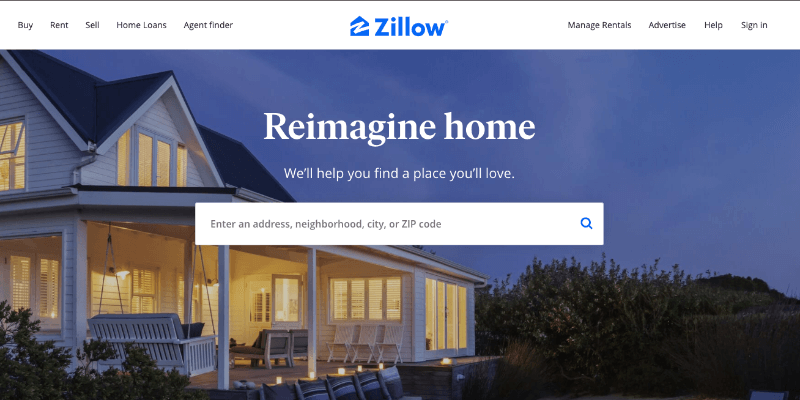
This API belongs to the most illustrious real estate portals and it provides its customers with all they need and ensures access to the full range of real estate solutions such as buying the property, selling the property, repairing, leasing, investing, and more. This helps real estate developers to create the most powerful property platforms.
When it comes to the top key benefits, this API tracks the property prices. It uses the information that it collects and provides an estimated value of the other properties. This platform is completely free and is reliable. Zillow accounts for more searches in real estate and this indicates the success of the platform.
Walk score API
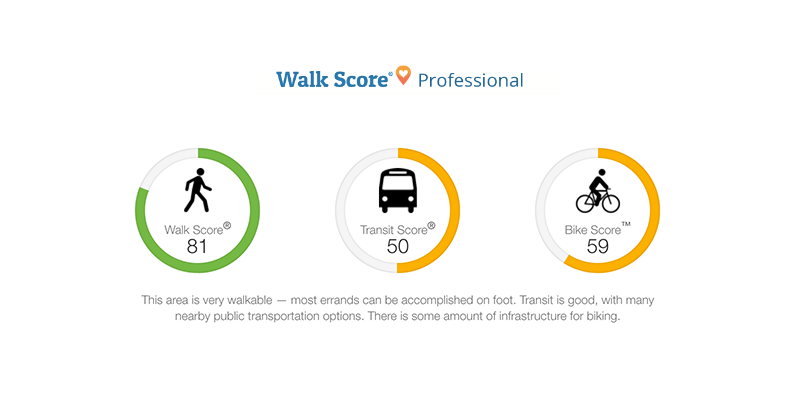
This API helps its users in finding the right housing. By using this you can determine the walkability indicator at the given address. This API can help in creating the real estate portals and help in organizing the property search function. It can also fulfill other similar tasks.
You can get 2 versions of the walk score API: the Paris and the free version. It has a convenient integration system. Even with the free version, you can get the high quality and reliability of the result.
Google maps API

Surely in the analysis of commercial real estate APIs, Google maps API plays a major role. In most of the APIs, it is crucial to use the maps, but with Google maps, you get a perfect solution.
Google maps’ has a multilingual interface that supports at least 50 languages. This allows you to visualize the information in the proper context. This supports both the web and the mobile platforms and you can be sure of the reliability of the result. With this API you can even get more advantages such as Google street view, Google places for business, Google earth.
Simply RETS
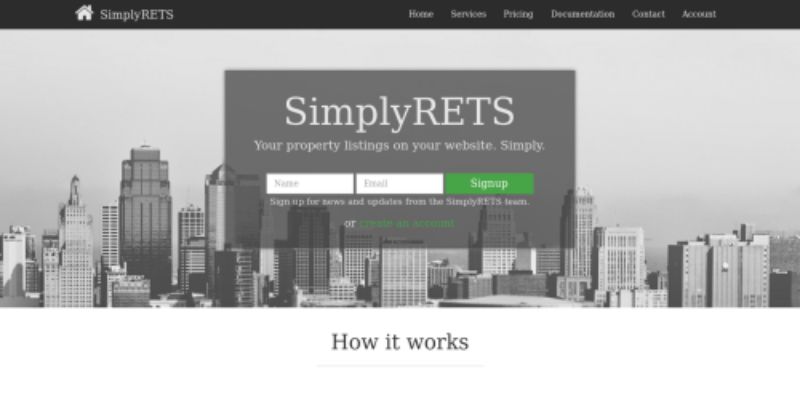
The next one of the real estate listings API is the simple RETS. This is also an important one that allows you to develop advanced mobile and web platforms. You can also integrate MLS databases into your resources. The main goal of this API is to work with property information as easily as possible.
With the key benefits, it provides the developers with more opportunities. It works with many programming languages. So it makes it easier for the developer to choose the options fitting him the most. It has a simplified API integration process. You can get them at convenient price rates.
Rets rabbit
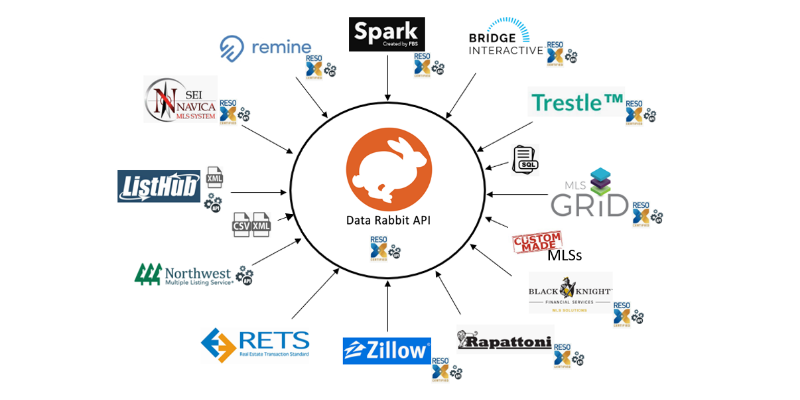
This API removes the nightmare of importing thousands of listings and photos. It gives you an easy import and web API. With these, you can focus on building your listing that is p[powered by the website or app.
Property API
This API provides easy access to all the developers. This data might be used for building mobile applications, web applications, SEO landing pages, and more others. This can help in driving revenue for your business. Therefore this API can provide access to recent home sales and individual property sales history. This API makes every property both on and off, an opportunity to draw the consumers.
Rets.ly
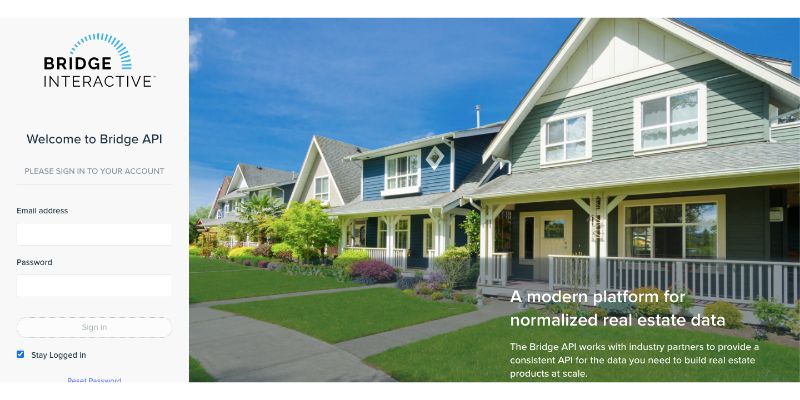
This platform helps you to access multiple MLS listing datasets. You can also access the real estate public records. The data is delivered elegantly through the API. It also facilitates managing the necessary data for you and the data provider. This helps the developers build the tools for realtors, brokerages, MLS, and consumers.
Realtor

This is also like other APIs. This is another property Meta search engine that provides the details about the properties that are for sale or rent. This API also provides nearby schools, finance rates, and mortgage calculators.
Commercial Real Estate Insights
This is a commercial real estate API that functions exactly as the name suggests. It provides valuable insights into the real estate industry, specifically related to business properties. With a single endpoint, it returns critical business information such as building square footage, distance to the nearest building, nearby swimming pools, vacancy rates, number of floors, and more. This API is a powerful tool for those in the real estate market, offering key data that can be integrated into real estate websites to enhance user experience and provide detailed property insights.
Rent Estimate
This is an API that helps you to budget and calculates rent for a specific property. You have to input the relevant parameters like bedrooms, bathrooms, type of property, etc.
Therefore these are some of the real estate APIs which can help make the house hunting apps.
